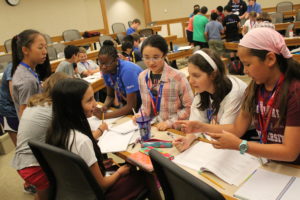Katrina Hill is teacher in Roanoke, Virginia, where she teaches language arts and social studies to students in middle school. Katrina started the school’s Model UN program as an Advisor three years ago, and had the opportunity to attend the Best Delegate Advisor Institute this past summer.
As a teacher and a parent, I hear how detrimental too much technology can be for our children on a daily basis. Between books, articles, Facebook posts to blogs, we hear that our children don’t know how to have face to face conversations, how to communicate unless it’s through a device and that too much time on a screen desensitizes them.

However, I have found at least one antidote to the concept that technology is detrimental – Model UN. This is my third year as an advisor to a group of middle school students, and just today, at a conference in Washington, D.C., I watched six of my students go their separate ways, into different committees on their own.
As I sat in on their committees, I noticed how each one was talking to other students they didn’t know, forming coalitions and blocs, and working together. There was focused dialogue, negotiating to reach a consensus, and challenges while trying to reach a compromise. As this was a middle school conference, no technology was allowed, and it was clear that none of the students missed it. Instead of texting their friends, sending SnapChats or ignoring the room to play a game, they were talking and engaged in real world content.
Access to and the ability to use technology is vital in our current culture, and I appreciate how my students utilize their devices. We can research from just about anywhere and at any time, as we learn more about their topics. They often exchange phone numbers with new friends in committee. And in some cases, access to laptops and internet allows students to collaborate in real time on different documents. But instead of technology hindering them, it helps to propel them forward. They actively practice using technology as the tool it is rather than abusing the access.
It’s true that we need to mindful of how much time our students spend on their devices, but technology is not going away. It is important that our students don’t just know how to use the technology, but how to use it responsibly. Any Model UN experience requires students to do thorough and accurate research, and gives them an opportunity to practice using these tools effectively and conscientiously. Model UN is one way to teach our children how to find a middle ground, while using technology as a tool.
